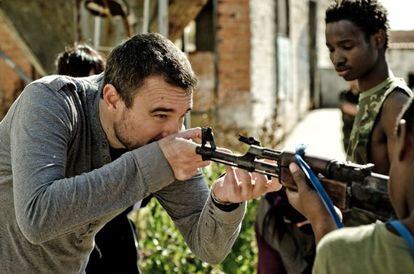Taking aim at the Academy Awards
Made for 40,000 euros in five days, Spanish child-soldier drama makes Oscar shortlist


A group of old school friends are meeting in a restaurant. Suddenly a waiter appears: there is an urgent call for one of the diners. “My cellphone had run out of battery. I thought something serious had happened,” explains Esteban Crespo, the guy who got up to take the call. The speaker at the other end of the line was hysterical — another bad sign. The news, however, turned out to be all good: Crespo’s short film Aquel no era yo (or, That Wasn’t Me), the winner of the 2013 Goya for Best Fictional Short Film, had just made the shortlist for next year’s Oscars.
There is still another round of selection to go on January 16 when the remaining 10 films in the Best Live Action Short Film category will be whittled down to just five. But in the meantime Madrid-born Crespo is enjoying the moment. “If we were eventually to go to Los Angeles, it would be an alien experience.”
Dreadfully human, on the other hand, is the story that has brought him to this point. Aquel no era yo is a 25-minute drama about child soldiers in an unspecified African setting, which could be any one of the many countries where more than 250,000 children carry guns instead of toys, according to Human Rights Watch.
It was one of these children’s stories that inspired Crespo. “If you witness a murder once, you feel afraid, your stomach turns, you vomit, you cry. When the crime becomes part of your daily life, you become anesthetized,” Ishmael Beah, a former child soldier in Sierra Leone, told El País Semanal in 2008.
“I told his story without emotion, I didn’t dress it up. I only added postscripts to explain the context, as if to suggest that, in his situation, you would have done the same,” Crespo says.
It was because of its message, among other things, that charities such as Amnesty International and Save the Children got behind the film, even screening it in several schools. It also received some institutional funding — 40 percent — with Crespo financing the rest of the 40,000-euro budget out of his own pocket.
Watching the film, though, you might think a lot more money had been spent on it. But Crespo came up with the recipe for mixing special effects and saving: a combination of favors, such as borrowing tanks and missile launchers from the Spanish army; organization — it was all shot in five days; luck; a good atmosphere; and a fake exotic flavor. “We recreated Africa in Escalona del Prado [in Segovia province]. But the palm trees are digital. I spent a whole trip to Morocco photographing them,” he says.
However he did it, the result has now reached the slopes of cinema’s Mount Olympus. But he may have to climb up them alone. The ICAA government film institute has told him it cannot guarantee the financing that until now has been available each year to help Spanish films competing for prizes at the main festivals. Without technical or promotional means, he’ll just have to trust in the quality of the film.
After six shorts and 150 awards, Crespo wants to start experimenting in features. He has three arrows in his quiver: an English-language detective story set in the crater of an extinct volcano; a comedy based on his short Nadie tiene la culpa (or, It’s nobody’s fault), and another thriller set in Africa about oil. He is certain that his bow will shoot out one of them sooner or later. But another hysterical phone call on January 16 would also help.










































